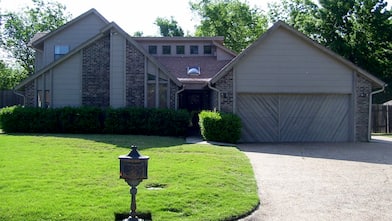Highlights
Brick stain is a cost-effective, durable, and easy-to-care-for alternative to brick paint or resurfacing.
Brick stain works by soaking into and attaching to brick or stone masonry.
Despite its many pros, brick stain comes with a few cons, including that it can be difficult to apply.
Though brick may seem immovable, there are so many ways to change its appearance. Paint and resurfacing are the most well-known options, but brick stain is just as worthy of your attention. From being long-lasting to inexpensive, keep reading to find out all you need to know to decide if staining brick is the right option for you.
What Is Brick Stain?
Brick stain is a type of finish that’s used to change the color of brick or stone masonry. It works by soaking into and binding with the brick to permanently alter its appearance, and it can be used on everything from exterior walls to fireplace mantles.
What’s the Difference Between Brick Stain and Paint?
Unlike brick stain—which is absorbed by the brick after it’s been applied—brick paint forms a thin, distinct layer over masonry. Though a good brick paint job can last for years, it’s not as much of a permanent solution as brick stain because it will eventually flake and deteriorate over time.
What Are the Advantages of Staining Brick?

There are a handful of great reasons to consider staining brick, from the cost-efficient to the cosmetic. Consider these pros when making your choice.
Pro: Long-Lasting
As long as brick stain is applied correctly, it can last for anywhere from 20 years to forever. That’s because the finish is absorbed by the brick, making it impossible to wash or peel off. That extra layer of protection also has the added bonus of shielding your house from the elements. And brick can be stained to its original color or something totally new.
Pro: Inexpensive
Brick staining costs an average of roughly $0.70 to $2 per square foot, or $300 to $3,000 for entire projects. By contrast, costs to paint a brick house often start at $3,500 and brick repair costs are about $1,500 on average.
Pro: Easy to Maintain
Unlike brick paint, which needs to be sealed after application, brick stain requires no extra protective measures to keep it looking great. Simply wash it as you normally wash your brick masonry and expect beautiful results.
What Are the Disadvantages of Staining Brick?
Although staining is an excellent option, there are also a couple of downsides to consider before deciding if it’s right for you. Here are some of the biggest cons to staining brick.
Con: Some Brick Can’t Be Stained
There are a couple of instances where brick stain is a non-starter. If your brick is already coated with a non-porous sealant, for example, it will be impossible for the brick to properly absorb the stain. If you’re not sure if this is the case for you or not, test a stain on a small part of your brick to find out.
On the other hand, masonry that’s severely damaged, deteriorated, or dirty will need to be completely fixed, restored, or cleaned before applying stain to ensure everything looks as it should.
Con: Lengthy Application
Though painting brick can be a relatively quick project, brick stain takes time to apply properly. Brick must be fully cleaned and repaired before application to guarantee even coloring, and this can take a lot of time and cause a lot of mess if not completed by the right hands.
Con: Not Always DIY-able
Small brick staining projects—like fixing up your fireplace mantle or updating the coloring on a chic garden path—are fair game for avid DIYers. But larger brick staining projects, like redoing exterior walls or an entire patio, are better left to the professionals because of the skill level required to ensure the stain is evenly and cleanly applied. Find a local masonry contractor if this is the kind of project you had in mind.





